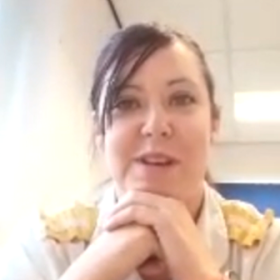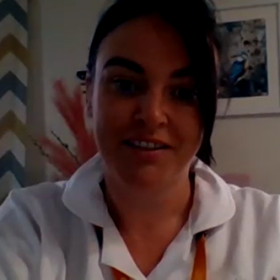Sarah Whyte
Trainee Assistant Practitioner
North Manchester Community Neuro and Stroke Rehabilitation Team
Sarah Whyte is a senior support worker and trainee assistant practitioner for the North Manchester Community Neuro and Stroke team within the Manchester Local Care Organisation, part of Manchester University NHS Foundation Trust.

“I’m working with physios, occupational therapists, speech [and language therapists], so I’m not just doing one thing I’m learning all different skills from all different clinicians.”
Sarah Whyte's story
Sarah began her journey as a Band 2 Healthcare Assistant at a neuro rehabilitation unit. In this role she was inspired by the physiotherapists and occupational therapists she seen carrying out their roles and witnessed the positive impact they had on patients and their rehabilitation journeys. Sarah then applied for a Band 3 role within the Community Falls team, part of the North Manchester Community Neuro and Stroke team, and from there her journey as an AHP began. With the support of her manager, Sarah is now a Band 4 senior support worker within the North Manchester Community Neuro and Stroke team.
In her current role, Sarah completes triage calls and carries out non-complex assessments of referrals with neurological conditions, such as Parkinson’s disease, multiple sclerosis and motor neurone disease, which she then hands over to the most relevant clinician (e.g. a physiotherapist, speech and language therapist, occupational therapist). Alongside her role, Sarah is a health and wellbeing champion, a reserve in the armed forces, helps to run the Parkinson’s exercise group within the team and is completing a two-year Health & Social Care foundation degree to become an Assistant Practitioner, which is funded by Manchester University NHS Foundation Trust.
For Sarah, the biggest highlight of her role is witnessing people’s journeys and life improvement, from conducting core assessments, deciding the best course of action to help that person live more independently in their own home and then seeing the positive difference that has been made to their life.
Through working with different clinicians, Sarah is always learning and utilising new skills which allows her to support service users in many different ways, such as delivering speech therapy, occupational therapy, fatigue management, and mobility exercises.
Next steps
Sarah wants to continue progressing her career as an AHP and, on completion of her foundation degree, hopes to either continue her university studies to achieve a full Health and Social Care degree or, depending on opportunities available, would like to do an apprenticeship in physiotherapy or occupational therapy.
Sarah’s Top Tips
- If you want to become an AHP – go for it. It’s such a rewarding career and you learn so many skills from the different clinicians you work with.
- Ask about opportunities available to support your career progression. Have conversations with your manager about what opportunities are available and how they can support you.




